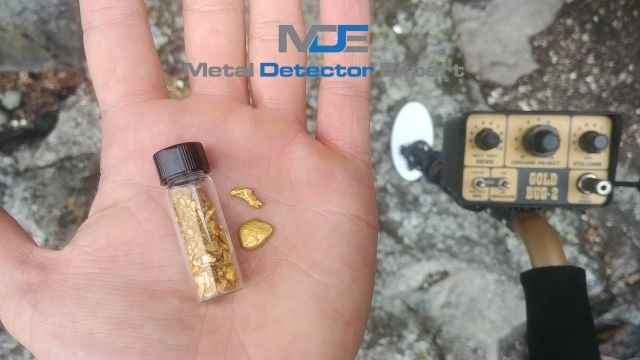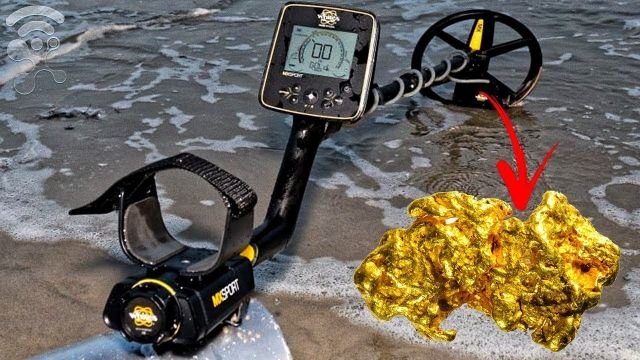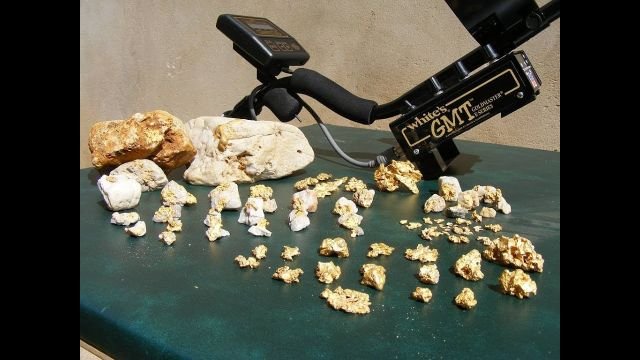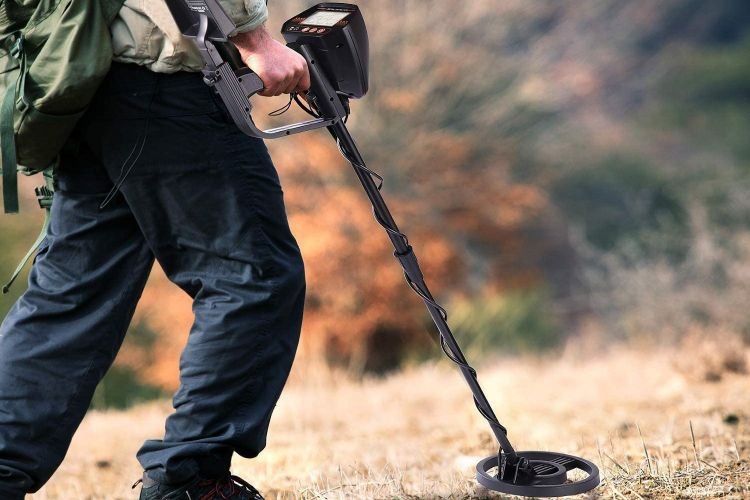Is your metal detector able to detect gold or do you have to have a specialised detector to find this precious metal?
While there may be more hurdles to overcome with standard, very low frequency metal detectors, you may have some success hunting for gold in the right areas. But your best bet is a gold medal detector.
Every metal detecting hobbyists want s that big find. Many want this big find to be gold, both for the bragging right and the monetary value of the precious metal.
However, if you are to have any success at finding a solid piece of gold then you need to understand how equipped your metal detector is to find gold nuggets.
Can all metal detectors find gold?
Contrary to popular belief, you do not need a special gold finding metal detector to find gold in the ground.
All metal detectors are, in some capacity, able to find hidden gold if the nuggets are big enough and your metal detector is set to the right settings.
However, if you are hunting specifically for gold, then it is best to invest in a gold metal detector. These are designed to best pick up on gold in the ground regardless of the nugget’s size.
What can prevent a metal detector from finding gold?
While all metal detectors have the ability to detect gold, most will not pick up on the metal for various number of reasons.
So if you are planning on using your standard metal detector to hunt for gold, then be aware of the following:
Size of the nugget
Just because your metal detector is not alerting you to any gold does not mean that there is not any gold to be found. It may just be that the gold nugget is too small for your standard detector to find.
Gold nuggets are worth more the bigger they are but there is still a lot of value int he smaller nuggets.
As such, if the pieces are too small you could be missing out on a fortune.
Object depth
It may be that right beneath your detector is a gold nugget big enough to buy a whole new metal detector. But it could be far too deep into the ground for your machines’ electromagnetic currents to reach.
There are ways to make your metal detector more powerful so that these currents can reach further into the ground.
Although a simple settings adjustment still may not be enough to detect gold nuggets.
If you are wanting to cover as much ground and depth as possible when hunting for gold then it is advised that you get a metal detector that can do so without overlooking deeply buried gold nuggets.
Gold’s low conductivity
The main reason that you may be missing out on large gold nugget pieces is the fact that your metal detector’s frequency is not strong enough to pick up low conductivity metals e.g. gold.
There are ways to make your detector’s frequency better but there are limits to metal detectors that are not specifically designed to send out high frequency levels that gold can receive better.
Decide what kind of gold you want to find
All of the above are limits and hurdles that you may crash into during your gold hunt. But not all of those points will apply.
Depending on what type of gold you want to find can increase your chances of finding it.
Pure gold nuggets are the form of gold that will cause you the most trouble when using a standard metal detector. Make sure to keep in mind the above information and if you are lucky then you will find some gold nuggets.
On the other hand, if you are more interested in searching for gold in the form of jewellery then there may be fewer hurdles to overcome.
Very few pieces of gold jewellery are 100% made completely out of gold. There are usually a few other metals that accompany the gold to ensure that your necklace does not fall apart.
The more different types of metal included in the jewellery, the higher your chances of finding the object is.
Low frequency, standard metal detectors are often recommended by professional gold hunters as they are best for finding gold jewellery or gold coins.
Therefore if you wish to just find gold jewellery instead of golden nuggets then you will not need to pay out for a top of the range gold decor, your standard meal detecter will do.
How to decide what detecor to use
Now that you have decided what kind of gold you want to find as well as the limitations that come with hunting for gold, you are able to decide what type of metal detector best suits your gold finding needs.
The most important element of any metal detector you are looking to buy for gold is the type if frequency technology it uses.
There are two stypes if technology available To you: pulse induction (PI) and very low frequency (VLF).
Pulse induction is mostly found to be used in intermediate elvel emtal detecors or the ones that are more speciialsed for deteciruing certain metals like gold.
This is is because pulse induction has the ability to generate frequencies that penetrate deeper into the ground, finding objects that are harder to detect or have been buried for longer.
Very low frequency is the technology type that most metal detectors use and is perfect for finding jewellery, coins and other sorts of treasures.
These types of detectors work by having two coils.
One produces a magnetic field that is designed to detect metal objects and the other receives the currents that bounce off of the metal objects.
The system that theses could use is very basic so is unable to pick up on the harder to find metals or deeply buried objects, but it does make very low frequency metal detectors more affordable. Ideal for beginners.
Due to the specialised technology, pulse induction metal detectors are usually more expensive than very low frequency detectors.
That being said, if you are wanting to hunt for gold and only gold then you may find that they are worth the price.
Know your areas
Okay, so you have chosen your type of metal detector, the frequency technology it uses and the obstacles that may prevent you from finding gold. Now what?
Arguably the most important part of gold hunting is knowing the site and the soil you are working with.
Gold in its most basic form is a mineral. As such, you are more likely to have a successful gold hunt in areas that are very mineralised.
That being said, if you have a metal detector that is operating or set to operate at a high frequency then you will not have as much success so low frequency detectors in areas of high mineralisation.
There may be areas that simply do not pair well with very low frequency type detectors.
The best thing to do to avoid disappointment once you get to your hunting site is to research the area and see what other hobbyists have to say about their successes or failures with gold in that specific area.
This way you will know exactly what type of metal detector you need to achieve the best result or if the area is even worth hunting.
Why Is It Important to Choose the Right Metal Detector for Detecting Gold?
When it comes to detecting gold, choosing the right metal detector is crucial. A high-quality metal detector find gold ring can make all the difference in your success. With the right tool, you can increase your chances of finding valuable gold pieces and make the most out of your prospecting efforts.
Where best to hunt for gold
As mentioned, you are more likely to be able to find gold in areas with high levels of mineralisation. But where else can you look?
Once again, you should do some research on where gold has been found before to determine where you hunt for it.
Whether this is an abandoned gold mining area or a site that has made other gold hunters rich. If there has been a success in one area before then the chances are that it is a great place to hunt for gold again.
Something to be mindful of is whether or not the site is public property or is privately owned.
There are countless metal detecting laws that apply to various types of land and change depending on who that land belongs to.
Not only is it illegal to trespass on private property but there are some public places that require you to turn over any significant finds to the authorities. Meaning that if you find a substantial piece of gold, legally you may not be able to take it home with you.
Just make sure to do your research before you set out on any detecting exhibition and you will not be disappointed.





